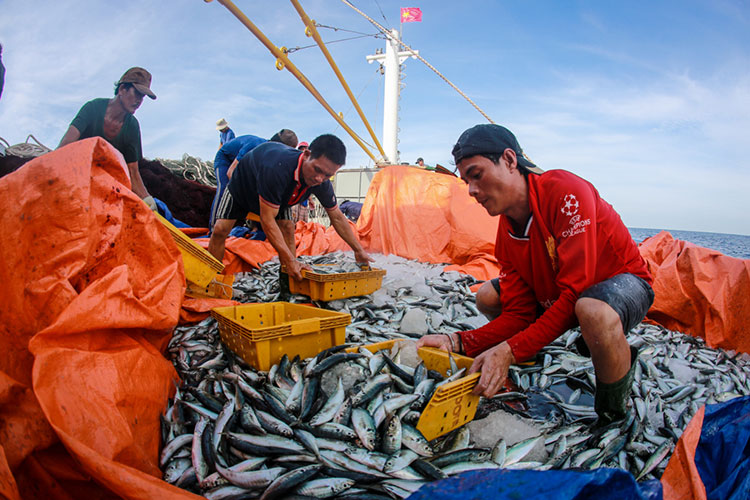Despite being one of the industries with high production and export value, the fishery sector has always been short of a large number of workers, especially high-quality workers, especially in the increasingly difficult field of exploitation. This is a difficult problem for the industry, as the “input” in training is always less than the demand.
For many years, the issue of finding "friends" on each fishing trip has always been a key issue for fishing boats, as the labor shortage has caused many fishing boat owners to miss trips. In Phú Yên, Deputy Director of the Department of Agriculture and Rural Development Nguyễn Tri Phương said that the locality's 1,200 offshore fishing vessels need about 8,500 workers. However, fishing boats are always short of workers, especially those who are able to operate modern equipment on fishing boats.

One partly attributed reason is that historically, marine labor training has primarily followed a "heritage" model, where experienced individuals pass down their knowledge to the next generation. However, nowadays, many young people are reluctant to pursue careers at sea due to the strenuous nature of the work and the instability of income. As a result, the primary source of labor, transmitted through experiential knowledge, has nearly depleted, giving way to temporary and passive labor.
According to a general assessment, the quality of maritime labor is a pressing issue. Maritime laborers today have lower levels of education compared to those in other professions, particularly those engaged in offshore fishing on vessels equipped with modern facilities. The Resolution of the Eighth Central Committee Plenum of the twelfth term regarding the Sustainable Development Strategy for Vietnam's Maritime Economy until 2030, with a vision to 2045, acknowledges that the development of maritime human resources has not yet become a decisive factor in sustainable maritime economic development. Investments in the development of maritime human resources remain limited, and efforts in training, skill development, and supporting job transitions for coastal residents are inadequate to meet the demands. Therefore, enhancing the quality of human resources in the fisheries sector is an urgent and essential task, both in the short term and in the long run.
From the Central Government's directive, in recent years, the issue of training human resources for the maritime industry has been a focus of attention in localities, implemented through programs such as rural vocational training, certification for ship captains, engineers, and crew members, as well as training and technical guidance for marine product exploitation and preservation. Additionally, guidance is provided for crew members on operating steel-hulled and vessels made from new materials.
In Binh Dinh province, approximately 4,000 individuals have received training and certification for ship captains, engineers, and crew members, while around 3,000 people engaged in maritime activities have undergone vocational training. Although these numbers may seem modest compared to the total maritime workforce in the province, they form a crucial foundation for gradually elevating the skills of the maritime labor force for long-term strategic purposes.
Meanwhile, in Ben Tre, in 2021, the Provincial Party Committee issued Resolution 04-NQ/TU on the development of Ben Tre towards the East during the 2021-2025 period, with a vision towards 2030. This resolution outlines key tasks and principal solutions for the province's fisheries sector.
Specifically, recognizing fisheries as a key economic sector with a focus on in-depth development, the province has taken steps to prepare its human resources for this economic domain. An example of this is Ben Tre's collaboration with the Nha Trang University of Fisheries to train students in fisheries-related fields. Simultaneously, the province organizes training programs and technical workshops for ship captains and crew members of fishing vessels, facilitates career orientation, and imparts new skills to fishermen for transitioning from environmentally harmful and unsustainable fisheries practices. There are arrangements for the consolidation, upgrading, expansion, and management of the training infrastructure for processing fisheries resources to align with the production development needs. Policies also encourage research and training institutions to collaborate with businesses to quickly integrate new technological advancements into production. Training and development programs are in place to enhance the management capabilities and professional expertise of specialized personnel in the field.